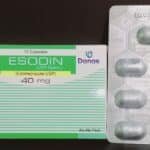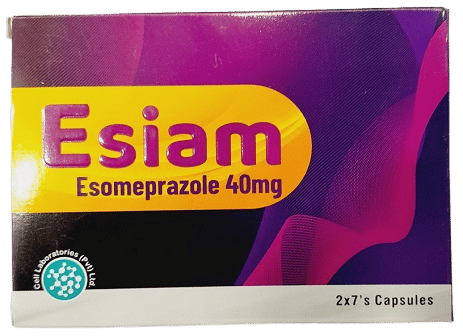delivery within 72 Hours
Esiam 20mg Capsule
₨ 780
Generic: esomeprazole
Pack Size: 14s
Product Form: Capsule
Delivery within: 2 to 3 working days across Pakistan
Shipping & Delivery
-
Courier delivery
Our courier will deliver to the specified address
2-3 Days
From Rs 250
-
Free 15-Day returns

Black Friday Blowout!
Description
Esiam 20mg Capsule contains esomeprazole, a proton pump inhibitor (PPI) medication used to treat various gastrointestinal conditions, including gastroesophageal reflux disease (GERD), peptic ulcers, and gastritis. Esomeprazole works by reducing the production of stomach acid, thereby alleviating symptoms and promoting healing of the digestive tract.
Uses:
- Gastroesophageal Reflux Disease (GERD): Esiam is indicated for the treatment of GERD, a condition where stomach acid flows back into the esophagus, causing symptoms such as heartburn, regurgitation, and chest pain.
- Peptic Ulcers: Esiam helps heal peptic ulcers (both gastric and duodenal ulcers) by reducing stomach acid production and allowing the ulcerated tissue to heal.
- Gastritis: Esiam may be used to manage gastritis, an inflammation of the stomach lining, by reducing acid secretion and relieving symptoms such as abdominal pain and discomfort.
How it Works:
Esomeprazole belongs to a class of medications known as proton pump inhibitors (PPIs). It works by inhibiting the proton pump in the stomach’s parietal cells, thereby reducing the secretion of gastric acid into the stomach. By decreasing acid production, Esiam helps alleviate symptoms associated with acid-related conditions and promotes the healing of damaged gastrointestinal tissues.
Directions for Use:
- Take Esiam 20mg Capsule orally, usually once daily, with or without food, as directed by your healthcare provider.
- Swallow the capsule whole with a glass of water. Do not crush, chew, or open the capsule.
- Follow your prescribed dosage and duration of treatment carefully to achieve the best results.
- If you miss a dose, take it as soon as you remember. However, if it is almost time for your next dose, skip the missed dose and continue with your regular dosing schedule.
Precautions:
- Inform your healthcare provider about any medical conditions you have, especially liver disease, kidney disease, or osteoporosis.
- Let your doctor know about all the medications you are taking, including prescription, over-the-counter, and herbal supplements, as some medications may interact with esomeprazole.
- Long-term use of Esiam may increase the risk of certain side effects, such as osteoporosis-related fractures or vitamin B12 deficiency. Discuss the risks and benefits of prolonged treatment with your healthcare provider.
Side Effects:
Common side effects of Esiam may include headache, nausea, diarrhea, abdominal pain, and flatulence. Serious side effects are rare but may include severe allergic reactions, kidney problems, or liver problems. If you experience any severe or persistent side effects, seek medical attention promptly.
When Not to Use:
Do not use Esiam 20mg Capsule if you are allergic to esomeprazole or any other ingredients in the medication. Additionally, inform your doctor if you are pregnant, planning to become pregnant, or breastfeeding before using Esiam, as it may not be suitable for use during pregnancy or lactation.
FAQ:
- How long does it take for Esiam to start working? Esiam may provide relief from symptoms of GERD and other acid-related conditions within a few days of starting treatment. However, full healing of gastrointestinal ulcers may take several weeks of consistent therapy.
- Can Esiam be taken on an empty stomach? Esiam can be taken with or without food, as directed by your healthcare provider. However, some people may experience better absorption when taking it before meals.
- Is Esiam safe for long-term use? Esiam is generally considered safe for long-term use under the guidance of a healthcare professional. However, prolonged use may increase the risk of certain side effects, so it’s essential to discuss the duration of treatment with your doctor.
- Can Esiam interact with other medications? Esiam may interact with certain medications, including anticoagulants, antiplatelet drugs, and some antibiotics. Inform your doctor about all medications you are taking to avoid potential interactions.
- Can Esiam cause vitamin deficiencies? Long-term use of Esiam may be associated with a decreased absorption of certain vitamins and minerals, such as vitamin B12, calcium, and magnesium. Your doctor may recommend periodic monitoring or supplementation to prevent deficiencies.
Customer Reviews
You must be logged in to post a review.










Reviews
Clear filtersThere are no reviews yet.